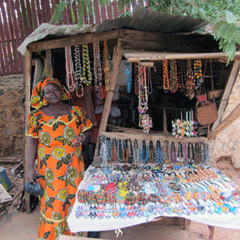[15 January 2015] – Today, the city of Dakar issued its first municipal bond aimed at raising financing for initiatives to improve the quality of life for the city’s poor.
It is the first-ever municipal bond in Senegal and West Africa, and a significant step for Dakar’s efforts to finance and provide essential infrastructure and services for all of its residents.
The 7-year, tax-exempt bond is expected to raise at least USD 40 million to build a central marketplace that will support some 3,000 street vendors. The funds will be repaid to domestic and international investors at a rate of 6.6 per cent per year.
The bond is part of a larger strategy developed by the Municipality of Dakar and Mayor Khalifa Sall to reduce congestion in the city streets and provide better commercial space for street vendors, which make up a large percentage of the city’s informal economy. The Dakar Municipal Finance Programme is supported by the Bill & Melinda Gates Foundation, USAID, the Public-Private Infrastructure Advisory Facility (PPIAF), and AfD. The Cities Alliance manages the initiative on behalf of the Bill & Melinda Gates Foundation.
Africa's billion-dollar municipal investment gap
Cities throughout Africa will no doubt be watching Dakar’s experience with the bond issuance very closely. Decentralisation policies have handed over responsibility for municipal service provision to local governments, but without the corresponding financing or capacity building needed to provide those services. While many governments have passed laws to promote fiscal decentralisation, very few are actually implemented.
A 2012 report by the World Bank, AfD and Cities Alliance, Financing Africa’s Cities, estimates that some USD 25 billion per year is needed to meet the municipal investment gap in Africa, while the current investment capacity of African local governments is estimated at just USD 10 billion over ten years.
Despite this pressing need, most African local governments have limited access to capital markets and private sector finance for their infrastructure projects. Essential and impartial supporting capacity – such as rating agencies – are also in very short supply. In addition to Dakar, only Johannesburg, Cape Town, and Douala have issued municipal bonds not backed by the central government.
The situation is especially challenging for secondary cities, which tend to have less direct access to markets than primary cities. Senegal is unusual in that it provides an opportunity for both – supporting larger cities such as Dakar and working with the Municipal Development Agency (ADM) for smaller Senegalese cities.
Learning from Dakar's experience
Initiatives such as the Dakar Municipal Bond are welcome indeed, not just for the benefits they bring the city’s residents, but also their potential to shape the efforts of other cities. Dakar’s experience will no doubt provide valuable insights into the enabling conditions that allow cities to have direct access to commercial finance, and what they need to do to meet those conditions.
It is clear that significant changes are needed in urban economic and financial governance, planning and management arrangements to develop the capacity of cities to finance and provide essential infrastructure and services. Otherwise, it will be nearly impossible for municipalities and urban utilities to cope with the increased demands of urbanisation.
As we have seen in cities throughout Africa, what happens then is that a city’s fiscal health deteriorates and it is unable to finance needed investments. Assets are not operated or maintained; balance sheets are unable to sustain debt needed to improve service delivery; and the city is unable to raise capital for infrastructure investments.
This deteriorating situation is most visible in the continued growth of informal settlements and slums, where services are frequently provided through inefficient, expensive parallel systems that fill the gaps created by public authority and market failures.
Hopefully, the occasion of Dakar’s bond issuance will also help focus the municipal financing debate on where it is most needed: a sustained emphasis on financial governance and continued dialogue on new, creative ways for cities to close their infrastructure gaps.
|
Cities Alliance Support for Municipal Financing |

Informal trader in Dakar, Senegal. Photo: Juliet Bunch/Cities Alliance
City infrastructure is created more efficiently when cities and local governments are empowered to plan, design and pay for the assets created.
Related Items
West Africa’s First Municipal Bond Enables Pro-Poor Investment in Dakar
Financing Africa’s Cities: The Imperative of Local Investment
Assessing the Institutional Environment of Local Governments in Africa




